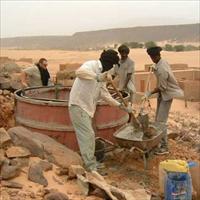GLOBAL: What happens to aid money?

Tired of navigating the often-secretive donor funding world, a group of international non-profits have launched the Publish What You Fund (PWYF) campaign to encourage donors to reveal timely and accessible information about how they are spending their money.
The group launched the campaign on 1 September at the Accra aid effectiveness forum, and include freedom of information organisations Access Info and Tiri, and NGOs such as Data/ONE, the UK Aid Network and Actionaid.
Donors are encouraged to adopt PWYF’s donor transparency principles, which commits them, among other things, to sharing timely information about their giving.
Twin initiative
The UK government’s Department for International Development (DFID) alongside 13 other donors, including the World Bank and European Commission, has also launched the International Aid Transparency Initiative (IATI), which pledges to develop a format that donors can use to publicise their spending by the end of 2009.
Even though more than 50 donor-tracking systems exist, Sarah Cook, DFID’s head of aid effectiveness and accountability says most are not user-friendly. “Information is either not available or only available in many different complex formats. It is hard for [people] who are supposed to be benefiting from aid to know how the money is being spent.”
According to Cook, easily-digested donor information is the only way to help aid recipients develop informed policy decisions, plan for the future, improve their monitoring and evaluation systems, and tackle corruption.
Leader of the PWYF campaign, Karin Christiansen told IRIN good information is key to effective aid. “This campaign on its own may not be able to improve accountability or planning, but having sound information on financial flows is key to making either of these work.”
Double-counted and out-of-date
Christiansen told IRIN Ugandan officials reported only knowing about half the aid projects underway in their country in 2006 and this is partly donors’ fault. “By providing information piecemeal, donors are expecting some of the poorest governments on the planet to be really joined up, which just isn’t realistic.”
What information donors do reveal is often out of date. “Take the Development Assistance Committee – it collects good information on aid flows, but it’s two years out of date by the time it’s published. This isn’t going to help if you’re trying to forward-plan,” said Christiansen.
With so many disconnected systems in place, money is easily counted twice. “Tracing money from a donor to the UN to an NGO, [then] to a local NGO is a very difficult chain to follow,” she added.
Freedom of information
Governments have made progress over the past few years, more countries have freedom of information laws than before and donors such as the World Bank, traditionally reticent to open their books, are changing, says Christiansen. “The World Bank now routinely discloses financial information, procurement agreements, and planning documents on its website.”
But Christiansen says there is still a wait-and-see approach among donors that do not want to share too much, too soon. “There is a fear that if you come out first, you’ll look bad. The emphasis has always been on demonstrating success over acknowledging failure… [therefore] the collectivisation of the [freedom of information] obligation is very useful.”
But for PWYF’s founder, it is still far from easy to extract information. “Now we’d like to see donors starting to feel an obligation to provide information without being asked.”
Fighting corruption
More aid watchdogs means less chances for corruption, says Douglas Alexander, UK Secretary of State for international development.
In a press release at IATA’s launch, Alexander was quoted as saying, “This initiative will be a crucial tool in the fight against [the misuse of aid]. If local people can see where aid should be going and question whether it has been effective, the scope for bribery and corruption is greatly reduced.”
Christiansen says she is pleased donors are starting to realise their part in making aid more effective. “We’ve made a lot of progress… there has been a shift in culture and this shows maturity in the sector.”
According to her, NGOs, UN agencies and other aid deliverers also have a responsibility to share their accounting. “There is also a mea culpa from the aid sector –while the legal burden is not as strong [on them to share information], it should be a matter of principle that [NGOs] do.”
PWYF campaigners say their role is to support donor reforms now, but they intend to critique poor performers as time goes on. “We’ll rank them according to their level of disclosure…and we plan to be very thorough,” Christiansen warned.
 Back and Next - Back and Next
Back and Next - Back and Next See Also - See Also
See Also - See Also